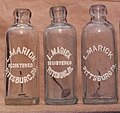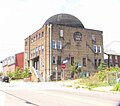Jews Hill (Pittsburgh)
This article needs additional citations for verification. (August 2007) |
Jews Hill is an obsolete colloquialism that had referred to a sprawling area of the city of Pittsburgh, Pennsylvania where many Jews lived. Several synagogues were built in the area. It of historical significance to students of the history of the city of Pittsburgh. Redevelopment of the area commenced in the 1950s and is still in progress. Most of the homesites and other structures which were intact in 1950 have been turned into dust. Vacant lots and parking lots are now common sights.
Citizens
Many Jewish merchants conducted businesses in the area. They sold clothing, notions, housewares, food, etc., and worked as tailors, etc. Soda water bottlers manufactured flavored carbonated beverages. Jews were postmen, too.
Of course, many non-Jewish people lived in the area as well. They included a wealth of European immigrants of various types.
Jewish soda water bottlers
The production of soda water ("pop") was carried on by Jews for about 85 years (1885-1970). They placed advertisements in R. L. Polk city directories with which their activities may be revealed and verified. Prominent amongst them were Phil Fisher, Louis Cohen, Max Solomon, Louis Marick, and A. Sigal of Acme Soda Water Co. They placed their products in bottles that were equipped with Hutchinson springs and assorted other types of bottles. Some of those bottles still exist; they provide physical evidence of the presence of Jews on "Jews Hill."
Phil Fisher
Phil Fisher was one of the earlier bottlers. He also owned Star Bottling Works.
A. Sigal
Acme Soda Water Company was located at 88 Roberts Street. The proprietor was the father of several sons who worked for him. They distributed their products to other parts of the city, too. They were in business for about 25 years (1890-1915).
Louis Cohen
Louis Cohen was established on Junilla Street around 1905 to 1912.
Louis Marick
Louis Marick was established on Vickroy Street[2] which has been absorbed into Duquesne University.
Max Solomon
Harris and Solomon (H&S) established Anchor Bottling Works around 1900. Max Solomon was the son of Mr. Solomon. Max Solomon still bottled soda water on Roberts Street in the 1970s, thus he was the last Jew to bottle his wares on "Jews Hill." He lived on Dinwiddie Street; he had been a bottler all of his life.
Others
There were others. Nathan Marcuson, Michael Minsky, Gabriel Saphira, and more were bottlers, too, but they were not as prolific, in general. The man who produced Tom Tucker beverages arrived late to the trade. Tom Tucker was a well-known brand of "pop" during the 1950s.
Minsky died early but his widow became known as "Mrs. Minsky" and sold eggs for many years.L. Polk
Gabriel Saphira bottled alone for several years after Minsky died. His name was misspelled "Sapiro" on his bottle.
The Tom Tucker bottling establishment was located in Shadyside during its prime years.
Pictures of some of their bottles
-
Phil Fisher bottle with paint applied on the embossing
-
Acme Soda Water Company bottles with paint applied on the embossing
-
Louis Cohen & son Hutchinson Patent Stopper bottle
-
Louis Marick bottles with paint applied on the embossing
-
Anchor Bottling Works bottles with paint applied on the embossing
-
Circa 1922 Anchor Bottling Works bottle etched "made in Czechoslovakia"
Jewish cemetery
A Jewish cemetery was located near Webster Avenue and Kirkpatrick Street,[3] but the corpses which had been buried there appear to have been removed to the Jewish cemetery that was established some miles away.
1908 Wylie Avenue


In 1915, the Hebrew Institute of Pittsburgh constructed a building at 1908 Wylie Avenue in the heart of Jews Hill. In 1942, the structure became the meeting place for Kay Boys Club, a vaunted organization that disappeared after "gender specific" organizations became unpopular. A third group occupies the structure in 2007.
The history of the structure is written on a plaque which is attached to the front of the building.
Dinwiddie Street

Dinwiddie Street is a four-blocks-long street that connects Fifth Avenue to Centre Avenue. The 200 block was the site of many homes. Homes on Dinwiddie Street were the finest on Jews Hill. Slumlords converted many of them into small apartments and single room units to rent them to poor people and others who had no use of a large home. Some of the homes were large stone buildings that stood alone on one lot. At least one of them still exists. About 1975 the city of Pittsburgh sold abandoned buildings on Dinwiddie Street for $100 each. Many buildings have been demolished, leaving vacant lots where they had existed.
Large Catholic churches preponderate

Around the beginning of the twentieth century, a number of large preponderating Catholic church were constructed in Pittsburgh. All of them still exist. Two were built along Centre Avenue right smack dab in the middle of "Jews Hill." Currently, the one built in 1902 is called Epiphany. The other has been turned over to "Blacks" and is called Saint Benedict the Moor. An effort is being made to present the area as a "cultural center" of "African Americans."
The influences of Catholics predominates some neighborhoods in the city of Pittsburgh at this time (2007).
The photograph above is of a view from the expansive and expanding campus of Duquesne University. It is a picture of the part of Jews Hill that has been obliterated and thoroughly redeveloped. Mellon Arena is visible in the picture.
From approximately 1870 to 1940, Jews were the primary ethnic group in that area, though by 1920 some Jews were established as far eastward as Herron Avenue where Silverman's drugstore was built at 601 Herron Avenue. It was set afire by arsonists around 1978.
Present conditions of The Hill


A mix of decayed homes, vacant lots with weeds and trees, and newly-constructed homes exists today. Old Passavant Hospital has been torn down.
Redevelopment of the areas will proceed during the next decades. There will be new homes constructed on Heldman street and on other streets as the need for more homes arises. At this time (2007), very little real estate taxes are being generated by the presence of decayed buildings and the vacant lots on Heldman Street. The production of various taxes paid by citizens is an important factor leading to the construction of homes within the city.
The Jewish community in Pittsburgh Today
When Pittsburgh's Jewish community left "The Hill" (as it is now called), they moved to another neighborhood on the other side of Oakland known as Squirrel Hill. Squirrel Hill is a cultural & economic center, and is one of the safest neighborhoods in the city of Pittsburgh. Squirrel Hill and The Hill are legally in the same jurisdiction (The City of Pittsburgh). Squirrel Hill is one of the few middle-upper income neighborhoods left in Pittsburgh proper because of the higher tax rate in the city compared to the suburbs. Despite the fact that Squirrel Hill and The Hill are legally in the same jurisdiction, Squirrel Hill does receive preferential treatment regarding some city services (most importantly police protection). Many of Squirrel Hill's current residents view it as the best of both worlds between the suburbs and the city. The Jewish community in Pittsburgh is thriving a mere 3 miles from the area this article was written about.
The phrase "Jew Hill" has more recently been informally used by some as a negative way to refer to Squirrel Hill.
Gallery
-
A Star of David on the eastern face of this building
-
A former synagogue at 25 Miller Street
-
Former Russian church on Reed Street
-
Former Union Hall at 35 Miller Street
-
Maltreated carved stone on Union Hall
-
Old grade school on Miller Street
-
Landmark plaque on old grade school
-
Hebrew lettering on 1908 Wylie Avenue
-
Razing of structures
-
Surviving old structures in August, 2007
-
Rubble near the present synagogue
-
Old marble Irene Kaufmann settlements is the most architecturally significant building on the hill








![72 Miller Street was a synagogue in 1920 [1]](/upwiki/wikipedia/commons/thumb/7/75/SynagogueOld072KI.jpg/120px-SynagogueOld072KI.jpg)










